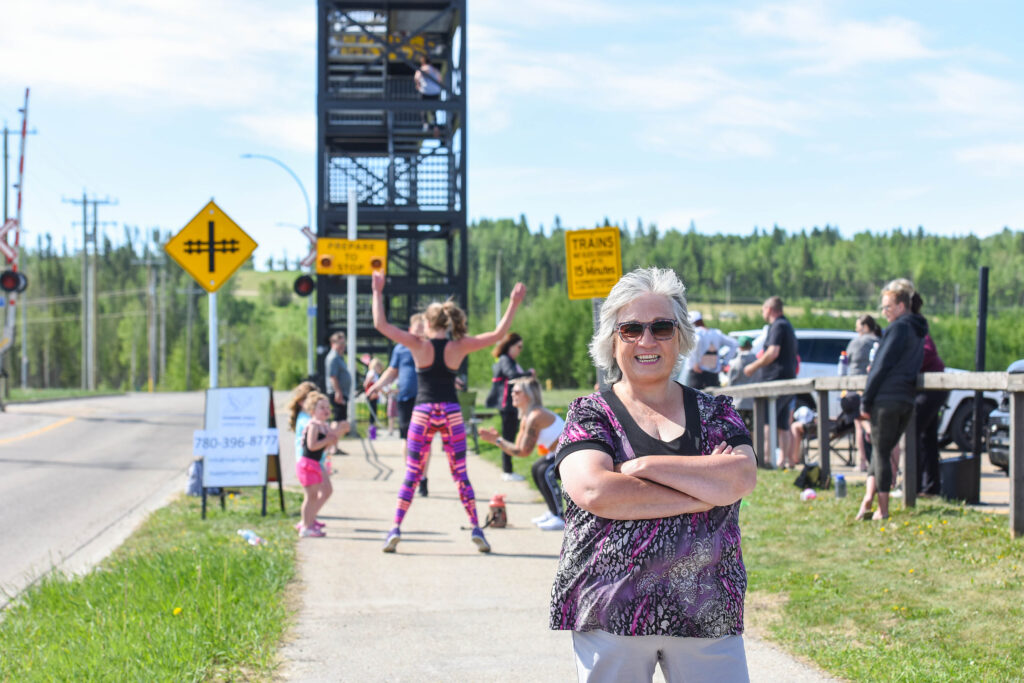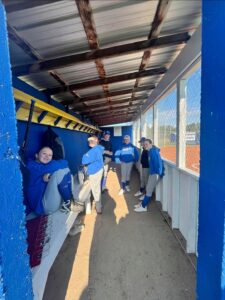Last Sunday, a group of friends took part in an extraordinary feat of physical strength to bring awareness to a crucial topic, homelessness. Led by Studio 83 owner Candice Zemp, the group of five did one specific activity for one hour straight in support of the Soaring Eagle Support Society (SESS). “They are trying to set up in town for homeless and disadvantaged people in our community. But, I think there is some confusion on what they are doing,” spoke Zemp.
She said that some people are under the assumption that SESS is creating a safe injection site. “It’s not a place for people to hang out and do that. It is a place for people to have a shower to go to a job interview or get a mailbox so they can get a driver’s license. It is a place for them to obtain resources so they can become positive parts of society.”
Just after 10 am on Sunday, June 6, Zemp started up the CN train stairs, Challa Marie Leidl from Original Joes began doing squats, Kay Partington from Whitecourt Ford started to do jumping jacks, Lyndsay Perkins from Re/Max Advantage Whitecourt began burpees, and Steve Rose from CS Rose Construction started jumping rope. By the time the hour was up, Zemp had completed 72 total sets (up and down as one set), Perkins did 780 burpees, Leidl completed 1508 squats, and Partington said she lost count of her jumping jacks once she passed the 1000 mark. As for Rose, “a guy sponsored me ten cents a skip, and he gave me $800, so that’s 8000 skips.” The group raised around $5000 in total.
One main area that Zemp wanted to help boost knowledge about was the newly named Eagle’s Nest up in the old Alaska Highway Motel. The project brought out concerned citizens on social media leading to a multitude of misinformation. Shelagh Watson, the owner of Soaring Eagle, explained that they are providing short-term transitional accommodation for people. “The federal government has a grant called the Rapid Housing Initiative (RHI). In 2020, they gave 500 million dollars to rural Canada and 500 million to urban Canada. The point of the grant is to purchase buildings, specifically motels, hotels or apartment buildings, renovate them and make them into housing for people who are homeless to get people off the streets as quickly as possible.”
She said that they applied for the grant but were put on hold as the government received 4.2 billion dollars worth of grant applications for a project they set 500 million aside for. Since then, the government extended the granting, allowing them to re-apply. “Our goal is to purchase the Alaska Highway Motel. We have been working very closely with the owners. They are community-conscious and are incredibly supportive of what we are doing. Since the grant was on hold, the owners chose to lease us the hotel.”
Now called the Eagle’s Nest, Watson said the hotel zoning is for short-term accommodations, but they hope to get that zoning changed. “To be able to take advantage of the RHI grant, we very well may have to adjust that zoning. We haven’t applied formally to the town at this point, but in discussions with development people and others at the town, it’s been made fairly clear that the zoning is not going to be adjusted at this point.” Shelagh said organizations in other municipalities face the same issue since, typically, hotels are in commercially zoned areas. “Our goal is to work with the town to do some community engagement and come up with a workable homelessness strategy in Whitecourt.”
What does homelessness look like in Whitecourt? People would likely be shocked to learn that there is a waiting list to get into Eagle’s Nest. “We have 16 short-term residents and a waitlist of people that want to get in. All those people are living homeless. That means they do not have appropriate sustainable housing meant to be housing. So, they were either living in their cars, a tent, living in a camper, couch surfing or living in hotels.” When Soaring Eagle opened in June of 2020, they had ten people accessing support through a part-time staff member. By September, they had over 60 open client files, and by January of 2021, that had more than doubled.
The original centre, located downtown, could not be zoned for overnight stays. “We had to decide whether the housing or support centre was more important, and we chose housing.” She said the rumours of it being a safe injection site are false. “I have no idea where that would have come from. I do not believe there has ever been a safe injection site application in Whitecourt. We are not a safe injection site. Transitional housing comes with supports, and it comes with a program, so none of these people can move in and do whatever. Our facility is entirely drug, alcohol, and weapons-free.” She said that people who stay could be using drugs or alcohol but that the site is clean. “That’s what housing first does, you house people first, and then you work on their challenges.”
Watson said that dealing with the fears that people have, thinking that issues will start popping up in their neighbourhood since the facility is near them, is challenging. “I could introduce you to everybody that is living at Eagle’s Nest. They are no different than your brother, your uncle, or your dad. They are regular people with struggles that need more help than the average person. Your next-door neighbour could very well be a drug addict, and you would have no idea, and you could live on Park. It does not make a difference. We have senior ladies that come in and volunteer. They make meals and talk with everybody. I’m sure if you asked any of them, they have no fear.”
Watson said they would be doing a presentation to Town Council soon. With this being an election year, she said residents should ask candidates where they stand on homelessness in Whitecourt. “There are other communities where homelessness is being alleviated, and that can happen in our community too. Homelessness in rural Alberta is a big challenge. The urban centres get all the money, and in the urban setting, homelessness is more obvious. In rural Alberta, it is hidden. That’s why everybody thinks we had two homeless people in Whitecourt that lived on park benches, and everybody knew them by name. And that’s not the case.”








More Stories
Community spirit shines at large-scale youth baseball event
Birthday party chaos sung beautifully by Pumpjack Players’ youth in spring musical
Gearing up for another season of cars, cruising and camaraderie